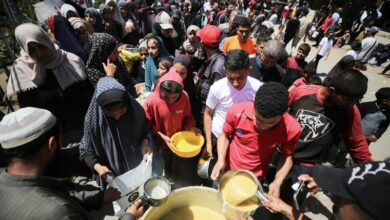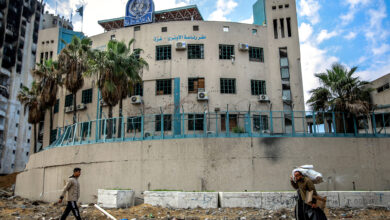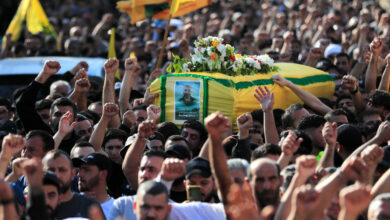Gaza-– Take this for a measure of Gaza’s economic woes: When the territory’s Hamas rulers announced plans to hire about 1000 new policemen, 15,000 applied.
Only a few of those reporting for fitness tests one recent afternoon expressed an interest in police work or said they belonged to the Islamic militant group. Most just wanted a job.
Plagued by poverty for decades, Gaza’s private sector has been all but wiped out by nearly four years of closed borders and last year’s devastating Israeli offensive. In the meantime, Hamas has solidified its grip, making it Gaza’s second largest employer
Amid growing desperation, announcements of the hiring campaign spread a blaze of hope among the territory’s unemployed young men.
Not everyone could apply. Candidates had to be between 18 and 20 years old, taller than 1.7 meters and weigh more than 70 kilograms. They could have no more than a high school education, since most would work as street officers and not commanders, said Hamas Interior Ministry spokesman Ehab Ghussein.
In four days, about 15,000 men signed up, Ghussein said. Over the past two weeks, Hamas has been holding daily drills to test their fitness.
One recent afternoon, about 400 applicants lined up near a sandy lot in Gaza City. When a Hamas officer in combat boots and black fatigues yelled their names through a bullhorn, they removed their shoes, showed their IDs and had their height and weight measured. They ran a lap on a track and did push-ups, sit-ups and pull-ups. Hamas officers, some toting rifles, jotted down their results.
Most of the applicants hailed from Gaza’s refugee camps. Few said they were interested in police work or expressed much enthusiasm for Hamas’ Islamic ideology. Some said their families made them come.
"The salary, what else?" said Majd Subah, 20, when asked why he applied. "If there was other work to look for, we’d go for that."
Subah said he needed work to get married. He had saved US$11,000 working in smuggling tunnels under the Gaza-Egypt border and fixed up an apartment for his bride, but her father refused to let her go until he had a real job, he said.
"I want to go back and tell him I’m a cop," he said.
Gaza’s already sinking economy has plunged in recent years. Israel sealed the territory’s borders after Hamas-allied militants captured an Israeli soldier in 2006.
The following year, Hamas seized control of Gaza from forces loyal to Palestinian President Mahmoud Abbas. Israel and Egypt tightened the blockade, leading to shortages of many goods.
Last winter, Israel launched a military offensive to stop Gaza militants from firing rockets at Israel. Some 1400 Gazans were killed, including more than 200 police officers. Thirteen Israelis were also killed.
Hamas now employs about 25,000 Gazans, said Gaza economist Omar Shaban, second only to the Abbas’ Palestinian Authority, which continues to pay 55,000 employees in Gaza since the Hamas takeover–though they now stay home.
About 80 percent of Gaza’s 1.5 million residents depend on food aid from the United Nations and other groups. There are no official figures, but some estimates put unemployment at more than 40 percent.
The recruits will join the 15,000 already serving in Hamas security services, Ghussein said. While many of them direct traffic and guard government buildings, others work for Hamas’ internal security service, which is widely feared and often accused of cracking down on political rivals.
Ghussein said applicants were not being vetted politically.
Even those landing jobs are unlikely to see their financial troubles disappear. Recruits will work for free for four months, then earn about US$260 per month for six months before being eligible for raises, Ghussein said.
Still, some looked forward to working for Hamas.
"God willing, I’m going to protect my country," said Momen Abu Athra, 20, who came out in a white skull cap and wispy beard and soundly beat the others in his running group.
Abu Athra, who has memorized the Quran, said he now teaches in an Islamic school but wanted to work "for an Islamic government."
Few others shared his zeal.
"I want to support my family and build my future," said Mahmoud Douda, 20.
Douda said he had earned about US$26 a day working in the tunnels, but being underground terrified him. Douda said he didn’t belong to any political group but would work for anyone who would give him a job.
"Hamas or not Hamas, people want to work," he said.




